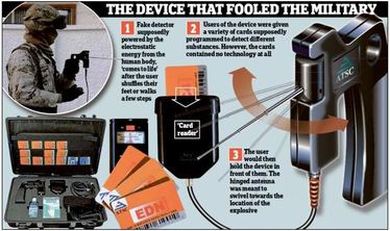Iraq PM Bans Usage Of British-Made ‘Fake’ Bomb Detectors
Following the recent, devastating attack by the Islamic States (ISIS) in Baghdad that left more than 200 persons dead, the Prime Minister of Iraq, Haider al-Abadi, has ordered his soldiers to stop using fake bomb detectors sold by a jailed British fraudster.

This is just as al-Abadi ordered a renewed investigation into the sale of the devices from 2007-10, which cost Iraq more than £53m and netted the Somerset businessman James McCormick enormous profits, as well as a 10-year jail sentence for fraud.
It was learnt that the wand-like devices – little more than aerials attached to plastic handles – are still widely used at security checkpoints around the country, years after the British con man who sold them was arrested for fraud and the U.K. banned their export.
The south-west Asia country’s supreme leader also declared a 3-day of mourning for the victims that were killed from the suicide truck bomb that ripped through a busy shopping district in the capital early on Sunday morning.
Following the monumental tragedy, scores of apparently peeved Iraqis took to social media to vent their displeasure at the inability of the government to protect its citizens.
Also, an Arabic hashtag began trending for “soup detectors,” mocking the absurdity that these handheld devices can detect explosives.
As a result of this, the Prime Minister ordered that all the country’s security forces should remove the handheld devices from checkpoints and that the Ministry of Interior should reopen its investigation into the corrupt deals for the devices.
McCormick is thought to have made more than $80 million selling the devices in countries including Iraq. McCormick’s company had claimed that the devices could detect contraband such as drugs and explosives from as far as a kilometer away. The manual for the device had said that with the right “substance detection cards” the devices could even detect elephants or $100 bills.
However, a BBC investigation in 2010 concluded that it was impossible that the device could detect anything at all. It described it as a “glorified dousing rod.”

